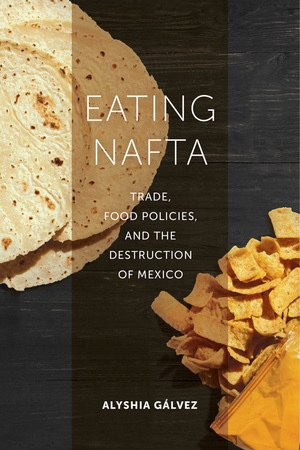Information here. Register here.

Alyshia Gálvez. Eating NAFTA: Trade, Food Policies, and the Destruction of Mexico. University of California Press, 2018.

This compelling book, by a Lehman College professor of Latin American Studies, links US trade policies to the destruction of Mexico’s corn economy and consequent destruction of Mexico’s traditional food culture, and shows how that destruction affected immigration, the border wall, drug wars, and, ultimately, public health.
Mexican food—real Mexican food—“is falling out of reach for many Mexican people,” she says.
Trade policies, in this case the North American Free Trade Agreement (just signed), not only affect what people eat, but also their health.
Gálvez starts by explaining
Using a Latin American studies frame, we can see that ever since the European conquest, ideas about citizenship, responsibility, and capability in the hemisphere have been viewed through the lenses of racialization, class, and gender. The same social groups viewed in the colonial and early independence periods as incapable of assuming the responsibilities of citizenship happen to be the same people now blamed for their own susceptibility to diet-related illness.
Gálvez gave a talk at NYU earlier this week at which she passed around a basket of traditional corn tortillas, obtained for $7 at Whole Foods. They were delicious. These, she pointed out, are almost impossible to get here or in Mexico, having been almost entirely replaced by commercial tortillas, having nothing like the original flavor and texture.
NAFTA dumped underpriced US corn on the Mexican market, undercut local prices, and put farmers out of business. Without local corn, mills went out of business.
The other speakers at her session, Mireya Loza and Krishnendu Ray of my NYU department, emphasized how NAFTA has induced irreparable losses, not only of small-scale farming and the livelihoods of small farmers and corn millers, but also of the food habits that used to define Mexico’s indigenous foodways.
They will be using Eating NAFTA in the courses they teach. Lucky students.
If you want to understand what “free trade” is really about—on the personal as well as the political level—this is the book to read.